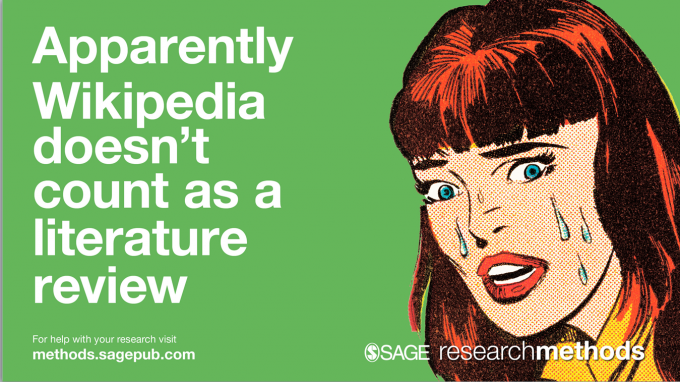What are research methods? Essentially, they are methods you might use to answer your research question(s). While ways of collecting and analysing data represent the core of research methods, you will probably have to address a range of additional methods as you carry out your research.
“A search and review of the literature is not a copy and paste job. It is not a search of the Internet, Amazon or the local bookshop. It is not something that can be done in an afternoon or a week.” – Hart, C. (2018) Doing a literature review. 2nd edn. London: Sage.
Is this you? If so, don’t panic! Try SAGE Research Methods! SAGE Research Methods is the ultimate methods library with more than 1000 books, reference works, journal articles, and instructional videos by world-leading academics from across the social sciences. The site is designed to guide you to the content you need to learn a little or a lot about your chosen research methods. The Methods Map can help those less familiar with research methods to find the best technique to use in their research.
SAGE Research Methods is available via the ‘Find Databases A-Z link on LibrarySearch. There is also a helpful online guide.
We also have other tools to help with literature reviews:
- Searching tips to help you develop search terms to use in resources such as LibrarySearch, specialist databases and Google Scholar.
- Skills4Study is an interactive study skills database also available on LibrarySearch via the Find Databases A-Z link. It is based on the work of expert Stella Cottrell (author of The Study Skills Handbook) and includes a module on Research principles.
Thinking critically about the quality of information and sources is a key part of doing good research at any level. David Bedford, Academic Support Librarian at the Drill Hall Library, has created a helpful video about this using BREAD:
He has also created an interactive guide to ‘The Anatomy of a Journal Article‘, which is a useful starting point for anyone who is not used to reading journal articles. Other guides to reading academic work include:
Greenhalgh’s book, How to Read a Paper (available in Augustine House Library and The Drill Hall Library), and Keshav’s article (also imaginatively titled ‘How to Read a Paper‘).
Of course, textbooks are also useful when doing research. However, be aware that their contents are likely to go out of date much faster than the content of a journal article, as they take longer to write and publish. You can find out more about finding and using textbooks on our webpages.
To find books about research methods, have a look at the following classmarks:
- 152.72 (Research methods in psychology)
- 301.72 (General books about research methods)
- 340.072 (Research methodss in law)
- 370.721 (Research methods for Education)
- 610.72 (Research methods in health)
- 792.0721 (Research methods for theatre and performance)
These are just a few examples. You may see a pattern! To find research methods in other subjects, search in LibrarySearch. You could search for ‘research methods nursing’, or ‘research social sciences’, for example.
When you’re searching for literature, it’s a good idea to keep a record of your search (i.e. the search terms you’ve used and where you’ve looked), and to ensure that you fully and accurately reference any sources you use in your work. You may find it useful to use a reference management tool, such as RefWorks (available via ‘Find Databases’ on LibrarySearch), to do this.
We hope you’ve found this guide useful. For more information, please contact your Learning & Research Librarian.
 Library
Library